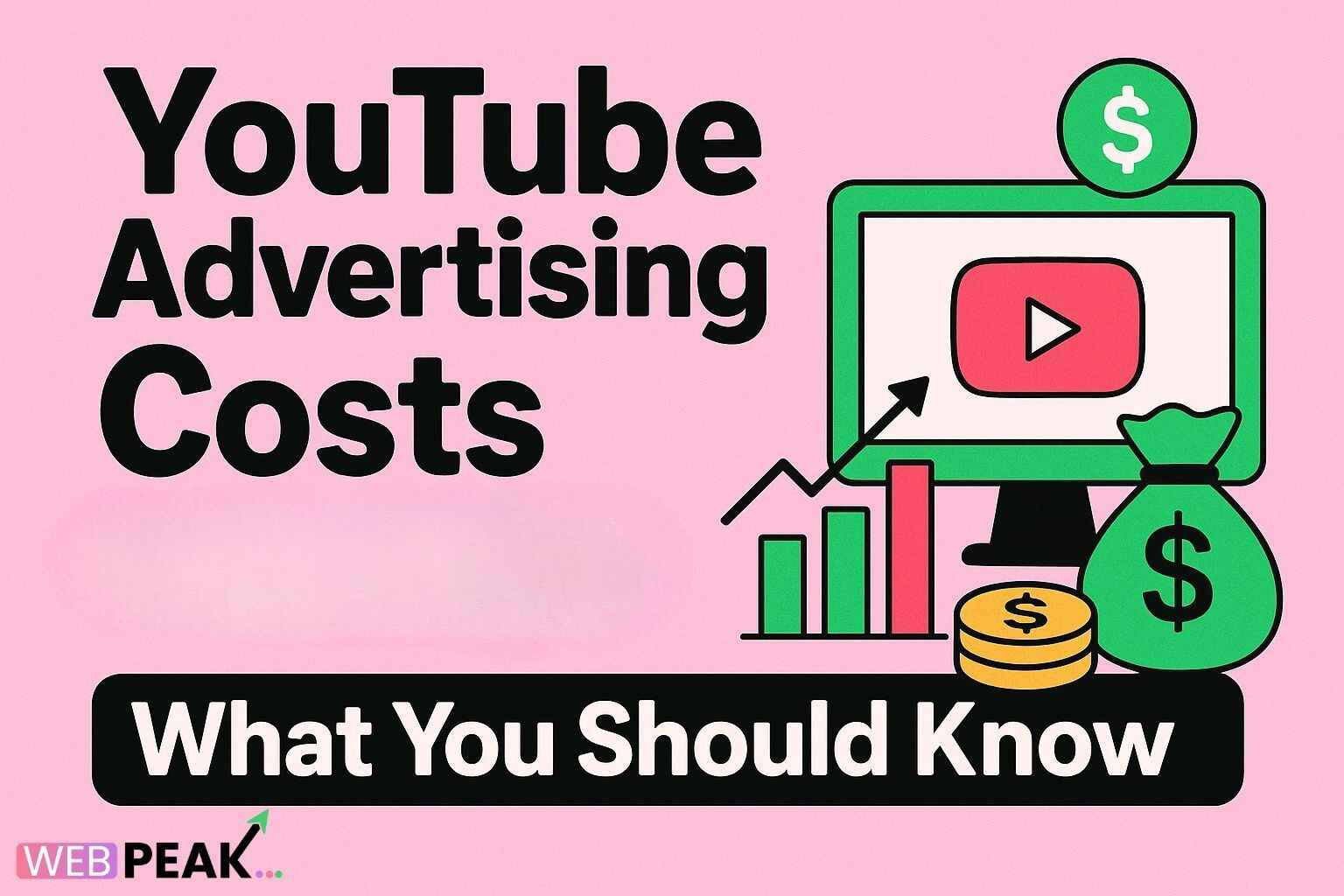YouTube Advertising Costs in 2026: What You Should Know
YouTube advertising costs in 2026 continue to be one of the most important considerations for businesses investing in digital marketing. As video content dominates online platforms, understanding how YouTube ad pricing works — including factors like bidding, targeting, and campaign types — can make a massive difference in your ROI. Whether you’re a small business owner, digital marketer, or content creator, knowing how much YouTube ads cost in 2026 and how to optimize them effectively is key to driving results and staying competitive in today’s fast-evolving ad ecosystem.
Why YouTube Advertising Still Dominates in 2026
With over 2.7 billion monthly active users and millions of hours of video watched daily, YouTube remains the world’s second-largest search engine and the leading video advertising platform. In 2026, the combination of AI-driven personalization and Google’s deep audience insights makes YouTube an even more powerful marketing channel.
- Global reach: YouTube reaches more people aged 18–49 than all cable TV networks combined.
- High engagement: Video ads are more memorable and persuasive than static banner ads.
- Advanced targeting: You can reach users based on interests, demographics, and even intent signals from Google Search.
Before you launch a YouTube campaign, understanding cost structures and variables ensures you spend smartly while maximizing visibility and conversions.
How YouTube Advertising Costs Are Calculated
YouTube operates on a cost-per-view (CPV) and cost-per-thousand impressions (CPM) model. However, YouTube’s costs vary based on campaign objectives, targeting options, bidding strategy, and competition in your niche.
1. Cost-Per-View (CPV)
With CPV bidding, you pay when a viewer watches at least 30 seconds of your ad (or the entire ad if it’s shorter) or interacts with it — such as clicking on a link or call-to-action overlay. The average CPV in 2026 ranges between $0.05 and $0.30, depending on audience targeting and ad type.
2. Cost-Per-Thousand Impressions (CPM)
CPM campaigns focus on brand awareness. You pay per 1,000 impressions, which means every 1,000 people who see your ad. In 2026, the average CPM on YouTube falls between $6 and $12, with premium placements (like homepage mastheads) costing significantly more.
3. Cost-Per-Click (CPC)
Although less common for YouTube, CPC campaigns charge advertisers each time someone clicks on their ad. The average CPC rate is around $1.50 to $3.00 in 2026.
Average YouTube Advertising Costs in 2026 (By Ad Type)
Here’s a breakdown of the most common YouTube ad formats and their typical costs in 2026:
| Ad Type | Average Cost (2026) | Best For |
|---|---|---|
| Skippable In-Stream Ads | $0.05 – $0.15 per view | Brand awareness and engagement |
| Non-Skippable In-Stream Ads | $6 – $12 CPM | Maximum reach and guaranteed visibility |
| Bumper Ads (6 seconds) | $4 – $10 CPM | Short, memorable branding campaigns |
| In-Feed Video Ads | $0.05 – $0.20 per view | Content discovery and engagement |
| Overlay Ads | $1 – $3 CPC | Clickable promotions within video |
Key Factors Influencing YouTube Advertising Costs
Several elements determine how much you’ll pay for YouTube ads in 2026. Understanding these helps you budget accurately and strategize better.
1. Target Audience
The more specific your audience targeting (e.g., “tech enthusiasts in California aged 25–34”), the higher the competition and cost per view. Broader targeting tends to be more affordable but less precise.
2. Industry or Niche
Highly competitive sectors such as finance, real estate, and technology typically experience higher ad costs. For instance, fintech companies might pay twice as much as entertainment brands due to increased bidding competition.
3. Ad Placement
YouTube allows you to place ads on specific channels, videos, or audience segments. Premium placements on high-traffic or niche-relevant videos generally command higher CPMs.
4. Bidding Strategy
You can choose between automated and manual bidding. Automated bidding uses Google AI to optimize conversions, while manual bidding allows advertisers to control how much they pay per view or impression. In 2026, hybrid strategies combining both methods are becoming common.
5. Ad Quality and Relevance
Ads that achieve higher engagement (watch time, clicks, or shares) cost less because YouTube’s algorithm rewards relevance and viewer satisfaction. High-quality videos with strong hooks and storytelling perform significantly better in lowering CPV rates.
How to Lower YouTube Advertising Costs in 2026
Controlling ad expenses doesn’t mean sacrificing visibility or performance. Here are proven strategies to reduce YouTube ad costs while improving campaign results:
- Refine targeting: Use detailed demographic, keyword, and placement targeting to reach users with higher purchase intent.
- Leverage remarketing: Re-engage users who have interacted with your website or YouTube channel before — they convert more cheaply.
- Optimize creative content: A strong hook in the first 5 seconds improves view rates and lowers CPV.
- Test multiple ad variations: Run A/B tests with different visuals, CTAs, and lengths to find the best-performing version.
- Use AI-powered tools: In 2026, YouTube’s automated ad optimization uses machine learning to improve bid efficiency and placement relevance.
YouTube Ads ROI: What to Expect in 2026
Return on Investment (ROI) for YouTube ads depends on your goals — brand awareness, lead generation, or direct sales. Businesses can expect an average ROI of 1.5x to 3x when campaigns are well-optimized. Factors improving ROI include compelling storytelling, strong calls-to-action, and precise audience targeting.
Many brands also integrate YouTube ads with Google Ads, allowing cross-platform remarketing. This combination ensures your message reaches users across both YouTube and the Google Display Network, maximizing conversions at lower incremental costs.
Budgeting for YouTube Ads in 2026
There’s no strict minimum to advertise on YouTube, but a monthly budget of $500 to $2,000 is generally recommended for small businesses aiming to gather meaningful data. Mid-sized companies typically spend between $5,000 and $20,000 monthly on video campaigns.
Pro Tip:
Start small. Run test campaigns with $10–$50 daily budgets, measure performance, and scale only the best-performing ad groups.
YouTube Advertising Trends to Watch in 2026
As YouTube continues to evolve, staying ahead of trends ensures your campaigns remain effective and relevant.
- AI-driven creative optimization: Machine learning now automatically edits and tests video variations for performance improvements.
- Shoppable YouTube ads: Interactive ads allow users to make purchases directly from the video interface.
- Connected TV (CTV) expansion: YouTube on Smart TVs has exploded, offering new ad inventory for big-screen audiences.
- Shorts monetization: YouTube Shorts ads offer affordable exposure for brands targeting Gen Z users.
These innovations make YouTube advertising not just a brand awareness channel but a direct conversion engine for businesses of all sizes.
Should You Invest in YouTube Advertising in 2026?
Absolutely — if you’re strategic. YouTube remains one of the highest-ROI channels for digital marketers, particularly as attention spans shorten and video continues to dominate user engagement metrics. Businesses that craft compelling video messages, test variations, and leverage data-driven insights consistently outperform competitors still relying on static ads or traditional media.
For professional help with your YouTube marketing strategy, consider partnering with WEBPEAK, a full-service digital marketing company offering Web Development, Digital Marketing, and SEO services tailored to boost your online presence and performance.
Final Thoughts
YouTube advertising costs in 2026 are dynamic, data-driven, and adaptable to any marketing budget. The key lies in understanding cost variables, optimizing creative assets, and leveraging AI tools to achieve measurable returns. As the platform continues to evolve, marketers who embrace its full potential will enjoy superior brand visibility and lasting audience engagement.
FAQs
1. How much does it cost to run YouTube ads in 2026?
In 2026, YouTube ads typically cost between $0.05 and $0.30 per view or $6 to $12 per thousand impressions. Costs depend on your targeting, industry, and ad format.
2. Are YouTube ads worth the investment?
Yes. YouTube ads offer high engagement, advanced targeting, and measurable results. Brands often see a 1.5x–3x ROI when campaigns are properly optimized.
3. What is the minimum budget for YouTube advertising?
You can start with as little as $10 per day. However, allocating at least $500 monthly helps collect meaningful performance data for optimization.
4. Which YouTube ad type performs best?
Skippable in-stream ads are the most popular and cost-effective, offering flexibility and viewer control while maintaining engagement and brand awareness.
5. How can I lower my YouTube ad costs?
Focus on high-quality video content, A/B testing, remarketing strategies, and smart audience targeting. Using automated bidding tools can also improve efficiency and reduce wasted spend.
6. Will YouTube ads become more expensive in the future?
Ad costs may rise slightly as competition increases, but AI-driven optimization and better audience segmentation can help advertisers maintain or even lower CPVs over time.





